Related Research Articles

Aberdare is a town in the Cynon Valley area of Rhondda Cynon Taf, Wales, at the confluence of the Rivers Dare (Dâr) and Cynon. Aberdare has a population of 39,550. Aberdare is 4 miles (6 km) south-west of Merthyr Tydfil, 20 miles (32 km) north-west of Cardiff and 22 miles (35 km) east-north-east of Swansea. During the 19th century it became a thriving industrial settlement, which was also notable for the vitality of its cultural life and as an important publishing centre.

The Vale of Glamorgan, often referred to as The Vale, is a county borough in the south-east of Wales. It borders Bridgend County Borough to the west, Cardiff to the east, Rhondda Cynon Taf to the north, and the Bristol Channel to the south. With an economy based largely on agriculture and chemicals, it is the southernmost unitary authority in Wales. Attractions include Barry Island Pleasure Park, the Barry Tourist Railway, Medieval wall paintings in St Cadoc's Church, Llancarfan, Porthkerry Park, St Donat's Castle, Cosmeston Lakes Country Park and Cosmeston Medieval Village. The largest town is Barry. Other towns include Penarth, Llantwit Major, and Cowbridge. There are many villages in the county borough.

The 1984–1985 United Kingdom miners' strike was a major industrial action within the British coal industry in an attempt to prevent colliery closures. It was led by Arthur Scargill of the National Union of Mineworkers (NUM) against the National Coal Board (NCB), a government agency. Opposition to the strike was led by the Conservative government of Prime Minister Margaret Thatcher, who wanted to reduce the power of the trade unions.

The Battle of Orgreave was a violent confrontation on 18 June 1984 between pickets and officers of the South Yorkshire Police (SYP) and other police forces, including the Metropolitan Police, at a British Steel Corporation (BSC) coking plant at Orgreave, in Rotherham, South Yorkshire, England. It was a pivotal event in the 1984–1985 UK miners' strike, and one of the most violent clashes in British industrial history.
Seven Sisters is a village and community in the Dulais Valley, Wales, UK. It lies 10 miles (16 km) north-east of Neath. Seven Sisters falls within the Seven Sisters ward of Neath Port Talbot county borough.
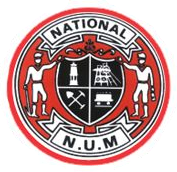
The National Union of Mineworkers (NUM) is a trade union for coal miners in Great Britain, formed in 1945 from the Miners' Federation of Great Britain (MFGB). The NUM took part in three national miners' strikes, in 1972, 1974 and 1984–85. Following the 1984–85 strike, and the subsequent closure of most of Britain's coal mines, it became a much smaller union. It had around 170,000 members when Arthur Scargill became leader in 1981, a figure which had fallen in 2023 to an active membership of 82.
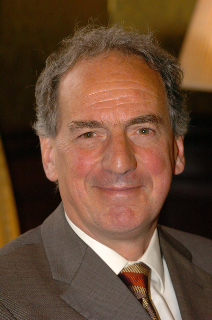
Kim Scott Howells is a Welsh Labour Party politician. He was the Member of Parliament (MP) for Pontypridd from 1989 to 2010, and held a number of ministerial positions within the Blair and Brown governments.

Ammanford is a town and community in Carmarthenshire, Wales, with a population of 5,411 at the 2011 census. It is a former coal mining town. The built-up area had a population of 7,945 with the wider urban area even bigger.
The Welsh Rugby Union is the governing body of rugby union in the country of Wales, recognised by the sport's international governing body, World Rugby.
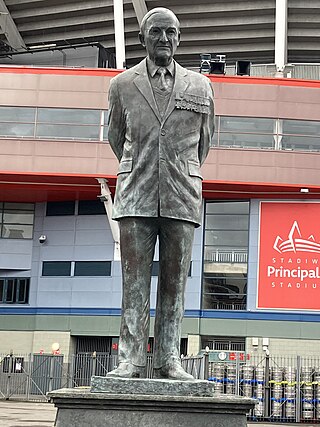
Sir Tasker Watkins was a Welsh Lord Justice of Appeal and deputy Lord Chief Justice. He was President of the Welsh Rugby Union from 1993 to 2004. During the Second World War, he served in the British Army and was awarded the Victoria Cross, the highest British award for valour in the face of the enemy. A war hero who was prominent in the law and in Rugby Union, Watkins was described as The Greatest Living Welshman.

Newbridge is a town and community in the county borough of Caerphilly, south Wales. It lies within the historic boundaries of the county of Monmouthshire.

The Miners Strike of 1910-11 was an attempt by miners and their families to improve wages and living conditions in severely deprived parts of South Wales, where wages had been kept deliberately low for many years by a cartel of mine owners.
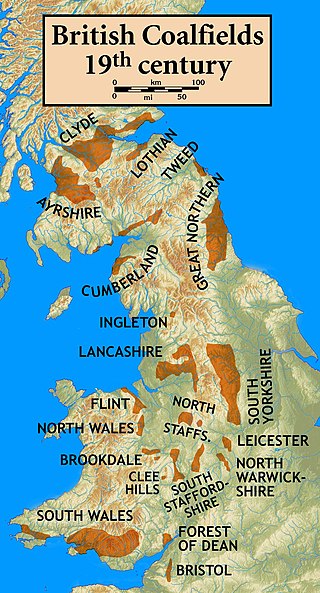
The South Wales Coalfield extends across Pembrokeshire, Carmarthenshire, Swansea, Neath Port Talbot, Bridgend, Rhondda Cynon Taf, Merthyr Tydfil, Caerphilly, Blaenau Gwent and Torfaen. It is rich in coal deposits, especially in the South Wales Valleys.

Treharris is a small town and community in the Taff Bargoed Valley in the south of Merthyr Tydfil County Borough, South Wales. It is located about 0.6 miles (1.0 km) west of Trelewis, from which it is separated by the Taff Bargoed river, and 0.9 miles (1.4 km) from Nelson in Caerphilly county borough and has a population of 6,356 from the 2011 Census. As a community, Treharris includes the villages of Quakers Yard and Edwardsville. Due to steepness and narrowness of both the Taff and Taff Bargoed valleys at Treharris several notable bridges and viaducts have been built in the area.
This article is about the particular significance of the year 1984 to Wales and its people.
David James Wilkie was a Welsh taxi driver who was killed during the miners' strike in the United Kingdom, when two striking miners dropped a concrete block from a footbridge onto his taxi whilst he was driving a strike-breaking miner to work. The attack caused a widespread revulsion at the extent of violence in the dispute. The two miners were convicted of murder but the charge was reduced to manslaughter on appeal, becoming a leading case on the issue of the difference between the two offences.
Llantwit Fardre is a large village and community situated on the A473, Pontypridd to Bridgend, road near the Welsh towns of Pontypridd and Llantrisant. Llantwit Fardre is also the name of the old parish and the community area that takes in the villages of Llantwit Fardre, Tonteg and Church Village. It is in the county of Rhondda Cynon Taf.
Philip Gordon Weekes was a Welsh mining engineer. As the National Coal Board's manager of the South Wales coalfields, Weekes played an important role mediating between the two sides of the miners' strike of 1984-85 in England, Scotland and Wales.
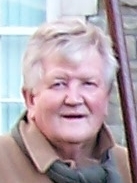
Tyrone O'Sullivan was a Welsh trade unionist who was Branch Secretary of the National Union of Mineworkers (NUM) and Chairman of Goitre Tower Anthracite Ltd., the owners of Tower Colliery.
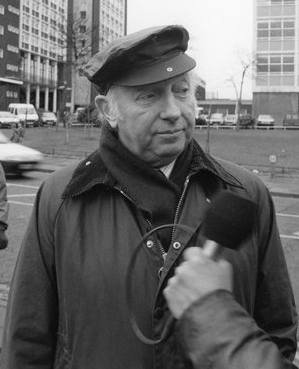
Arthur Scargill is a British trade unionist who was President of the National Union of Mineworkers (NUM) from 1982 to 2002. He is best known for leading the UK miners' strike (1984–85), a major event in the history of the British labour movement.
References
- ↑ "Home". Archived from the original on 15 July 2011. Retrieved 7 November 2007.
- ↑ South Wales Police [ dead link ]
- ↑ "1985: Miners jailed for pit strike murder". 16 May 1985. Retrieved 28 October 2021.
- ↑ Two-horse race to succeed Sir Tasker South Wales Argus - 3 August 2004
- ↑ WRU appoint new president BBC Wales Sport - 26 August 2004
- ↑ "Archived copy". Archived from the original on 5 December 2008. Retrieved 7 November 2007.
{{cite web}}: CS1 maint: archived copy as title (link) - ↑ "Llantwit Major RFC". Archived from the original on 28 August 2008. Retrieved 7 November 2007.